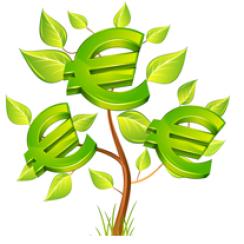European corporations these days are working feverishly to develop energy-efficient methods of doing business — not only to abide by new climate change regulations but also to gain favor with investors who increasingly are linking so-called green initiatives to companies’ abilities to cut costs and boost profitability.
[Click here to see the complete ranking for Europe's Most-Green Companies.]
“Investors are paying close attention to corporations’ environmental footprints, products’ impacts and levels of disclosure,” explains Henrik Steffensen, co-founder and vice president of marketing, business development and services at ASSET4, a Switzerland-based provider of environmental, social-responsibility and governance research.

Sustainability is about more than just being environmentally friendly. “Climate change is a serious problem and is going to completely change the way we produce and consume energy,” predicts Paul Dickinson, chief executive of the London-based Carbon Disclosure Project, an independent not-for-profit data provider. “There will quickly be multitrillion-dollar changes in how the economy operates.” Companies that adapt to a new way of doing business will likely win favor with investors.
One such company is Finland’s Nokia Corp., voted the greenest company in the Telecommunications Equipment sector. The mobile phone manufacturer integrates environmental responsibility into its overall business strategy, according to Kirsi Sormunen, vice president and head of sustainability. “We have a life-cycle thinking approach, from cradle to grave,” she says.
One of Nokia’s most successful initiatives has been its global recycling program, in place in 85 countries. “We have invested a lot in raising consumer awareness about their responsibility to bring back old, used electronic devices to collection points for proper end-of-life treatment,” says Sormunen. The firm runs 30 to 40 global take-back campaigns annually and retrieved 4.6 million phones last year.
Executives at BMW Group, ranked No. 1 in Autos & Auto Parts, understand that developing a green reputation is vital. “BMW is perceived as a very sporty and dynamic brand, and our customers don’t want to be blamed for being a detriment to the environment,” says Torsten Schuessler, head of investor relations.
Last year, as a result of an energy-efficiency program called BMW EfficientDynamics, the German automaker’s vehicles were among the lowest carbon dioxide emitters in their home country. From 1996 to 2008, BMW cut its line’s CO2 emissions by more than 25 percent. “We didn’t integrate EfficientDynamics into just one or two cars, we did it with the whole BMW fleet,” Schuessler says.
Munich Re, the top firm in the Insurance sector, has also been implementing responsible corporate governance and environmental management programs. The financial services provider, along with its MEAG Munich ERGO Asset Management division, was the first German company to sign the United Nations’ Principles for Responsible Investment, a set of guidelines on environmental, social and corporate governance issues to consider when making investment decisions.
“We aim to invest at least 80 percent of our equities and interest-bearing securities in assets that are included in a sustainability index, like the Dow Jones Sustainability index, or that satisfy generally recognized sustainability principles,” says Thomas Kabisch, CEO and CIO of MEAG.
The Carbon Disclosure Project’s Dickinson believes that the impact of climate change on corporate profitability will soon force many companies to answer the critical question, Are you part of the problem or part of the solution? That is clearly something many institutional investors are already asking.






